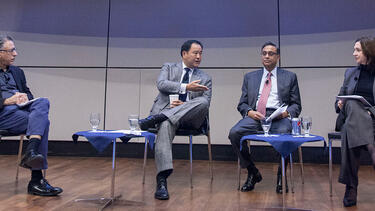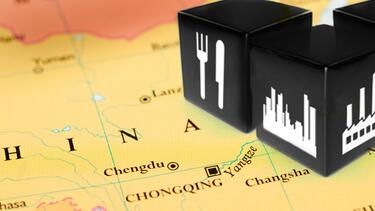Marketing
Connecting with the Consumer in a Distracted Age
Todd Kaplan ’06, CMO of Kraft Heinz, has redesigned the company’s creative process to deliver “marketing that happens.”

How Does Chanel See the Global Luxury Business?
The global luxury goods market recovered quickly from the financial crisis due in large part to growth in emerging markets, especially China. Chanel CEO Maureen Chiquet YC ’85 discusses how she shepherds the quintessentially French company in a fast-moving global market that may be transcending national identity.

Study Explains Pitfalls in Gift Giving
Research by Professor Nathan Novemsky and Yale SOM doctoral student Ernest Baskin helps to explain why we give bad gifts.
Celebrity Touch Raises Auction Prices
The degree of physical contact that a celebrity has with a piece of memorabilia affects how much collectors are willing to pay for it at auction, according to a study co-authored by Professor George Newman.
Can We Have Your Data, Please?
Top marketing executives discuss big data and how today’s companies are using all of the information they’re collecting about customers.

Why You Buy What You Buy
Professor Ravi Dhar runs through how recent research in psychology helps explain how we all make decisions when shopping. When are you impulsive? When do you really think things through? When do you make the good long-term choice? And when do you go for the junk food?

How is the definition of a bank changing?
Increasingly, a bank is a virtual entity rather than the imposing edifice downtown. Amy Brady, the chief information officer of Cleveland-based Key Bank, talks about the impact of technology on banking.
Want to Fix Social Security? Use the Right Wrench
In a New York Times op-ed, Professor Robert Shiller writes that President Obama’s proposal to change how inflation is measured in Social Security benefit calculations “…solves the wrong problem, and, in doing so, undermines the integrity of the Social Security system.” One alternative, suggests Shiller, is to link retirees’ benefits to GDP per capita, in current dollars, which would align the interests of the retired with those of society as a whole.
What are the forces changing the banking industry?
John Shrewsberry, the president of Wells Fargo Securities, outlines how government regulation and the ongoing tight credit environment are affecting the banking industry—and how big banks can keep up with the rapid pace of change today.
Where’s the investment opportunity in China?
Liang Meng, who founded a private equity firm after leading D.E. Shaw’s China operations, gives an overview of the fast-developing private equity market in China. He describes how demographic trends inform his investment strategy.

Can I charge that?
More and more, the answer is yes, as the credit card industry reaches billions of consumers and tens of millions of outlets. The CMO of MasterCard WorldWide talks about the company’s efforts to compete in this global market while responding to radically different technological infrastructures, legal institutions, and cultural understandings of debt.